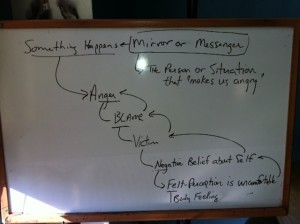The Anger Chain
The anger chain is shown in the chart below:
First, something happens that makes us feel uncomfortable, irritable, frustrated or even angry.
If there is anger, there is blame. You can check that out for yourself and you will find that if you’re anger, you’re blaming something. A person, an object, a situation or something.
If there is blame, then the one blaming is being a victim. Blame bascially means, “Something was done to me which means I am a victim.”
If there is a victim then there is a negative belief about the self. For example, “I am a victim,” “I am out-of-control,” “I am helpless,” etc.
If there is a negative belief about the self then there is an uncomfortable feeling in the body.
Notice that you can work up the chain, as well. You can go from having an uncomfortable emotion, to a negative self-belief, to feeling like a victim, to blame to anger. And, from that, you can actually create a bad situation that looks like something is being done to you.
In fact, the negative or uncomfortable emotion that first show up as a body sensation is where it starts. That is the “felt-perception” and that is what needs to be dealt with first. The way you deal with it, is to “feel” or “notice” it. That is notice the felt-perception in the body and feel it. After that come integration and resolution.

